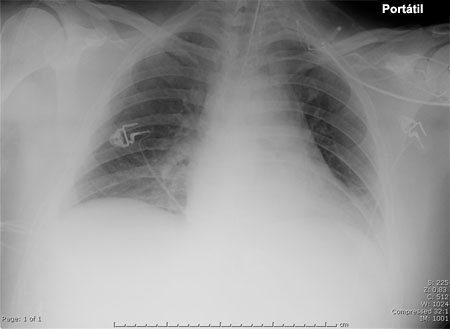Summary
Definition
History and exam
Key diagnostic factors
- presença de fatores de risco
- dispneia
- tosse produtiva
- febre
Other diagnostic factors
- dor torácica
- expansão assimétrica do tórax
- frêmito reduzido
- egofonia
- pectorilóquia áfona
- estertores ou roncos
- taquicardia
- mal-estar/anorexia
Risk factors
- controle ineficiente da infecção/higiene das mãos
- intubação e ventilação mecânica; pressão do manguito endotraqueal <20 cm H₂O
- posição supina
- higiene bucal ineficiente
- sedação/ausência de interrupção da sedação
- intubação/reintubação
Diagnostic tests
1st tests to order
- radiografia torácica
- contagem diferencial de leucócitos
- oximetria de pulso
- cultura de amostra do trato respiratório inferior
Tests to consider
- gasometria arterial
- toracocentese diagnóstica
- tomografia computadorizada (TC) do tórax
- proteína C-reativa
- ultrassonografia do pulmão
Emerging tests
- Swab nasal para MRSA
Treatment algorithm
antes dos resultados da cultura: sem fatores de risco para patógeno resistente a múltiplos medicamentos
antes dos resultados da cultura: com fatores de risco para patógeno resistente a múltiplos medicamentos, incluindo Pseudomonas e Staphylococcus aureus resistente à meticilina (MRSA)
após os resultados da cultura: devido a patógeno Gram-negativo
após os resultados da cultura: devido ao patógeno Gram-positivo
Contributors
Authors
Forest W. Arnold, DO, MSc, FIDSA

Professor of Medicine
Chief, Division of Infectious Diseases
Director Infectious Diseases Fellowship Training Program
Department of Medicine
School of Medicine
University of Louisville
Louisville
KY
Disclosures
FWA declares that he has no competing interests.
Peer reviewers
Krishna Sundar, MD, FCCP
Associate Professor (Clinical)
Department of Medicine
University of Utah
Director
Pulmonary and Critical Care Research
IHC Urban South
Utah Valley Pulmonary Clinic
UT
Disclosures
KS declares that he has no competing interests.
Ozan Akca, MD
Director of Research
Associate Professor
Department of Anesthesiology and Perioperative Medicine
Neuroscience and Anesthesia Intensive Care Unit
University of Louisville
Louisville
KY
Disclosures
OA declares that he has no competing interests.
Peer reviewer acknowledgements
BMJ Best Practice topics are updated on a rolling basis in line with developments in evidence and guidance. The peer reviewers listed here have reviewed the content at least once during the history of the topic.
Disclosures
Peer reviewer affiliations and disclosures pertain to the time of the review.
References
Key articles
Kalil AC, Metersky ML, Klompas M, et al. Management of adults with hospital-acquired and ventilator-associated pneumonia: 2016 clinical practice guidelines by the Infectious Diseases Society of America and the American Thoracic Society. Clin Infect Dis. 2016 Sep 1;63(5):e61-111.Full text Abstract
Klompas M, Branson R, Cawcutt K, et al. Strategies to prevent ventilator-associated pneumonia, ventilator-associated events, and nonventilator hospital-acquired pneumonia in acute-care hospitals: 2022 Update. Infect Control Hosp Epidemiol. 2022 Jun;43(6):687-713.Full text Abstract
Reference articles
A full list of sources referenced in this topic is available to users with access to all of BMJ Best Practice.

Diagnósticos diferenciais
- Doença do coronavírus 2019 (COVID-19)
- Edema pulmonar cardiogênico
- Síndrome do desconforto respiratório agudo
Mais Diagnósticos diferenciaisDiretrizes
- Strategies to prevent ventilator-associated pneumonia, ventilator-associated events, and nonventilator hospital-acquired pneumonia in acute-care hospitals
- Management of adults with hospital-acquired and ventilator-associated pneumonia
Mais DiretrizesFolhetos informativos para os pacientes
Pneumonia
Mais Folhetos informativos para os pacientesVideos
Dispositivos nas vias aéreas supraglóticas - Vídeo de demonstração
Via aérea nasofaríngea - Vídeo de demonstração
Mais vídeosConectar-se ou assinar para acessar todo o BMJ Best Practice
O uso deste conteúdo está sujeito ao nosso aviso legal